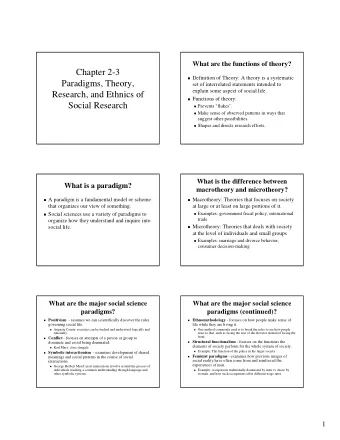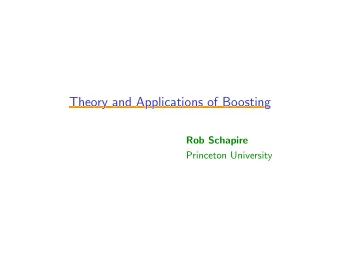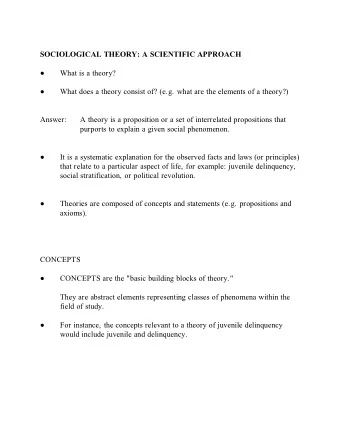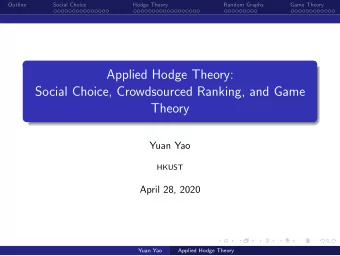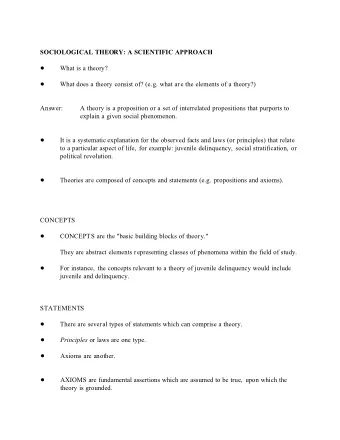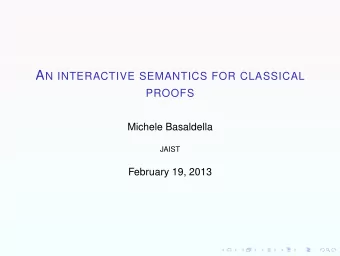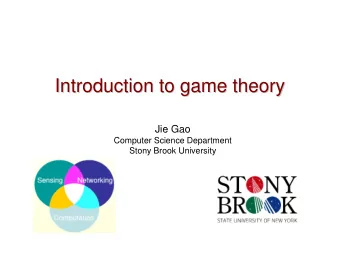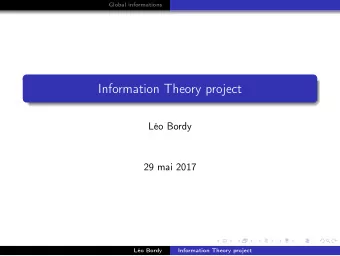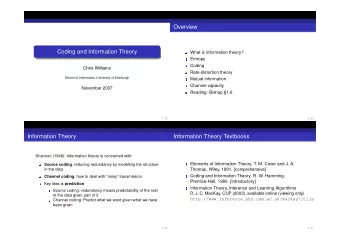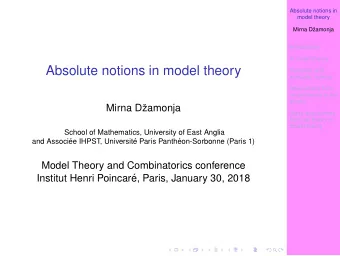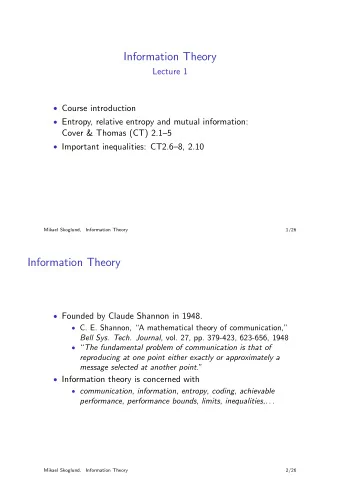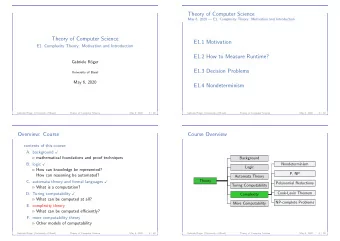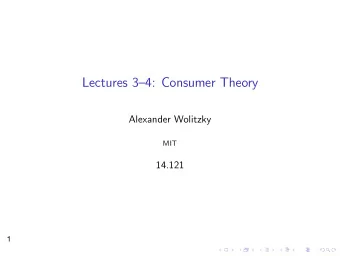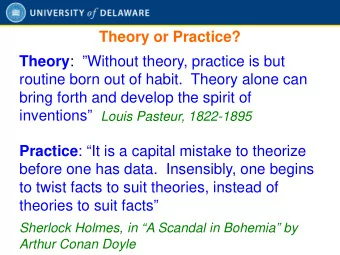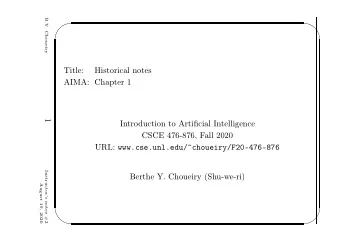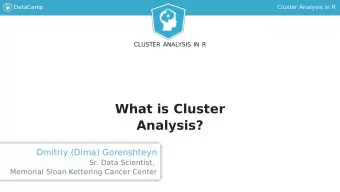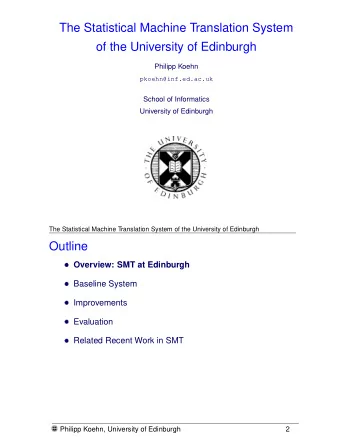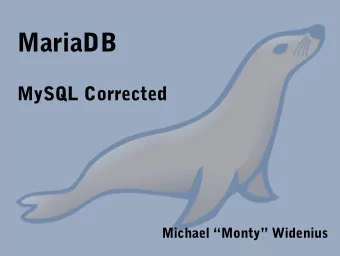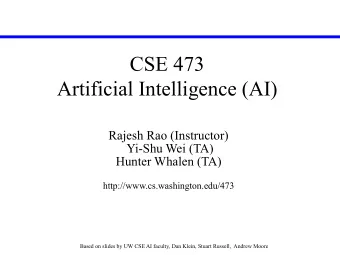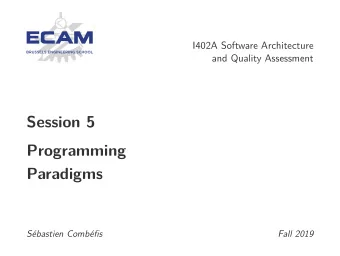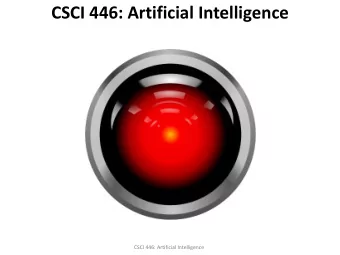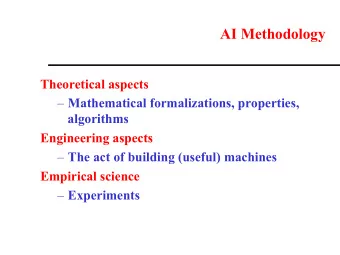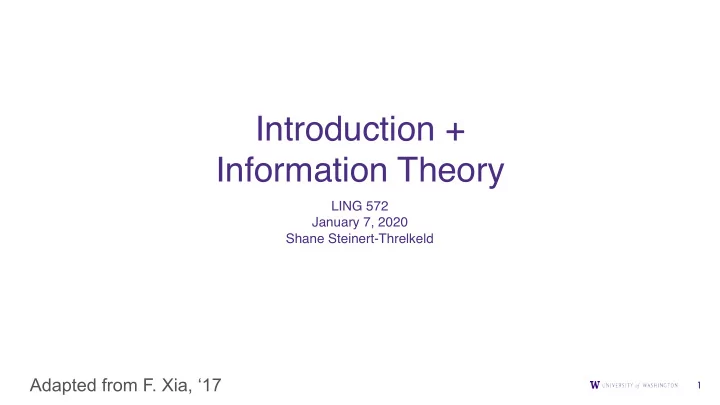
Introduction + Information Theory LING 572 January 7, 2020 Shane - PowerPoint PPT Presentation
Introduction + Information Theory LING 572 January 7, 2020 Shane Steinert-Threlkeld Adapted from F. Xia, 17 1 Outline Background General course information Course contents Information Theory 2 Early NLP Early
Introduction + Information Theory LING 572 January 7, 2020 Shane Steinert-Threlkeld Adapted from F. Xia, ‘17 1
Outline ● Background ● General course information ● Course contents ● Information Theory 2
Early NLP ● Early approaches to Natural Language Processing ● Similar to classic approaches to Artificial Intelligence 3
Early NLP ● Early approaches to Natural Language Processing ● Similar to classic approaches to Artificial Intelligence ● Reasoning, knowledge-intensive approaches 4
Early NLP ● Early approaches to Natural Language Processing ● Similar to classic approaches to Artificial Intelligence ● Reasoning, knowledge-intensive approaches ● Largely manually constructed rule-based systems 5
Early NLP ● Early approaches to Natural Language Processing ● Similar to classic approaches to Artificial Intelligence ● Reasoning, knowledge-intensive approaches ● Largely manually constructed rule-based systems ● Typically focused on specific, narrow domains 6
Early NLP: Issues ● Rule-based systems: 7
Early NLP: Issues ● Rule-based systems: ● Too narrow and brittle ● Couldn’t handle new domains: out of domain � crash 8
Early NLP: Issues ● Rule-based systems: ● Too narrow and brittle ● Couldn’t handle new domains: out of domain � crash ● Hard to maintain and extend ● Large manual rule bases incorporate complex interactions ● Don’t scale 9
Early NLP: Issues ● Rule-based systems: ● Too narrow and brittle ● Couldn’t handle new domains: out of domain � crash ● Hard to maintain and extend ● Large manual rule bases incorporate complex interactions ● Don’t scale ● Slow 10
Reports of the Death of NLP… ● ALPAC Report: 1966 ● Automatic Language Processing Advisory Committee 11
Reports of the Death of NLP… ● ALPAC Report: 1966 ● Automatic Language Processing Advisory Committee ● Failed systems efforts, esp. MT, lead to defunding 12
Reports of the Death of NLP… ● ALPAC Report: 1966 ● Automatic Language Processing Advisory Committee ● Failed systems efforts, esp. MT, lead to defunding ● Example: (Probably apocryphal) ● English � Russian � English MT ● “The spirit is willing but the flesh is weak.” � ● “The vodka is good but the meat is rotten.” 13
…Were Greatly Exaggerated ● Today: ● Alexa, Siri, etc converse and answer questions ● Search and translation ● Watson wins Jeopardy! 14
So What Happened? ● Statistical approaches and machine learning 15
So What Happened? ● Statistical approaches and machine learning ● Hidden Markov Models boosted speech recognition 16
So What Happened? ● Statistical approaches and machine learning ● Hidden Markov Models boosted speech recognition ● Noisy channel model gave statistical MT 17
So What Happened? ● Statistical approaches and machine learning ● Hidden Markov Models boosted speech recognition ● Noisy channel model gave statistical MT ● Unsupervised topic modeling ● Neural network models, esp. end-to-end systems and (now) pre-training 18
So What Happened? ● Many stochastic approaches developed 80s-90s ● Rise of machine learning accelerated 2000-present ● Why? 19
So What Happened? ● Many stochastic approaches developed 80s-90s ● Rise of machine learning accelerated 2000-present ● Why? ● Large scale data resources ● Web data (Wikipedia, etc) ● Training corpora: Treebank, TimeML, Discourse treebank 20
So What Happened? ● Many stochastic approaches developed 80s-90s ● Rise of machine learning accelerated 2000-present ● Why? ● Large scale data resources ● Web data (Wikipedia, etc) ● Training corpora: Treebank, TimeML, Discourse treebank ● Large scale computing resources ● Processors, storage, memory: local and cloud 21
So What Happened? ● Many stochastic approaches developed 80s-90s ● Rise of machine learning accelerated 2000-present ● Why? ● Large scale data resources ● Web data (Wikipedia, etc) ● Training corpora: Treebank, TimeML, Discourse treebank ● Large scale computing resources ● Processors, storage, memory: local and cloud ● Improved learning algorithms (supervised, [un-/semi-]supervised, structured, …) 22
General course information 23
Course web page ● Course page: https://www.shane.st/teaching/572/win20/index.html ● Canvas: https://canvas.uw.edu/courses/1356316 ● Lecture recording ● Assignment submission / grading ● Discussion! 24
Communication ● Contacting teaching staff: ● If you prefer, you can use your Canvas inbox for all course-related emails: ● If you do send email, please include LING572 in your subject line of email to us. ● We will respond within 24 hours, but only during “business hours” during the week. ● If you do not check Canvas often, please remember to set Account: Notifications in Canvas: e.g., “Notify me right away”, “send daily summary”. ● Canvas discussions: ● All content and logistics questions ● If you have the question, someone else does too. Someone else besides the teaching staff might also have the answer. ● We will use Canvas:Announcement for important messages and reminders. 25
Office hours ● Shane: ● Email: shanest@uw.edu ● Office hours: • Tuesday 2:30-4:30pm (GUG 418D + Zoom) 26
TA office hours ● Yuanhe Tian: ▪ Email: yhtian@uw.edu ▪ Office hours: ● GUG 417 (the Treehouse) ● Wed 3-4pm ● Friday 10-11am 27
Online Option ● The link to Zoom is on the home page: https://washington.zoom.us/my/ clingzoom ● Please enter meeting room 5 mins before start of class ● Try to stay online throughout class ● Please mute your microphone ● Please use the chat window for questions 28
Programming assignments ● Due date: every Thurs at 11pm unless specified otherwise. ● The submission area closes two days after the due date. ● Late penalty: ● 1% for the 1 st hour ● 10% for the 1 st 24 hours ● 20% for the 1 st 48 hours 29
Programming languages ● Recommended languages: ● Python, Java, C/C++/C# ● If you want to use a non-default version, use the correct/full path in your script. ● See dropbox/19-20/572/languages ● If you want to choose a language that is NOT on that list: ● You should contact Shane about this ASAP. ● If the language is not currently supported on patas, it may take time to get that installed. ● If your code does not run successfully, it could be hard for the grader to give partial credit for a language that (s)he is not familiar with. ● Your code must run, and will be tested, on patas. 30
Homework Submission ● For each assignment, submit two files through Canvas: ● A note file: readme.txt or readme.pdf ● A gzipped tar file that includes everything: hw.tar.gz (not hwX.tar.gz) cd hwX/ # suppose hwX is your dir that includes all the files tar -czvf hw.tar.gz * ● Before submitting, run check_hwX.sh to check the tar file: e.g., /dropbox/19-20/572/hw2/check_hw2.sh hw.tar.gz ● check_hwX.sh checks only the existence of files, not the format or content of the files. ● For each shell script submitted, you also need to submit the source code and binary code: see 572/hwX/submit-file-list and 572/languages 31
Rubric ● Standard portion: 25 points ● 2 points: hw.tar.gz submitted ● 2 points: readme.[txt|pdf] submitted ● 6 points: all files and folders are present in the expected locations ● 10 points: program runs to completion ● 5 points: output of program on patas matches submitted output ● Assignment-specific portion: 75 points 32
Regrading requests ● You can request regrading for: ● wrong submission or missing files: show the timestamp ● crashed code that can be easily fixed (e.g., wrong version of compiler) ● output files that are not produced on patas ● At most two requests for the course. ● 10% penalty for the part that is being regraded. ● For regrading and any other grade-related issues: you must contact the TA within a week after the grade is posted. 33
Reading assignments ● You will answer some questions about the papers that will be discussed in an upcoming class. ● Your answer to each question should be concise and no more than a few lines. ● Your answers are due at 11am. Submit to Canvas before class. ● If you make an effort to answer those questions, you will get full credit. 34
Summary of assignments Reading Assignments (hw) assignments Num 9 or 10 4 or 5 Distribution Web and patas Web Discussion Allowed Submission Canvas 11am on Tues or Due date 11pm every Thurs Thurs No late submission Late penalty 1%, 10%, 20% accepted Estimate of hours 10-15 hours 2-4 hours Graded according to Grading Checked the rubrics 35
Workload ● On average, students will spend around ● 10-20 hours on each assignment ● 3 hours on lecture time ● 2 hours on Discussions ● 2-3 hours on each reading assignment ➔ 15-25 hours per week; about 20 hrs/week ● You need to be realistic about how much time you have for 572. If you cannot spend that amount of time on 572, you should take 572 later when you can. ● If you often spend more than 25 hours per week on 572, please let me know. We can discuss what can be done to reduce time. 36
Recommend
More recommend
Explore More Topics
Stay informed with curated content and fresh updates.
